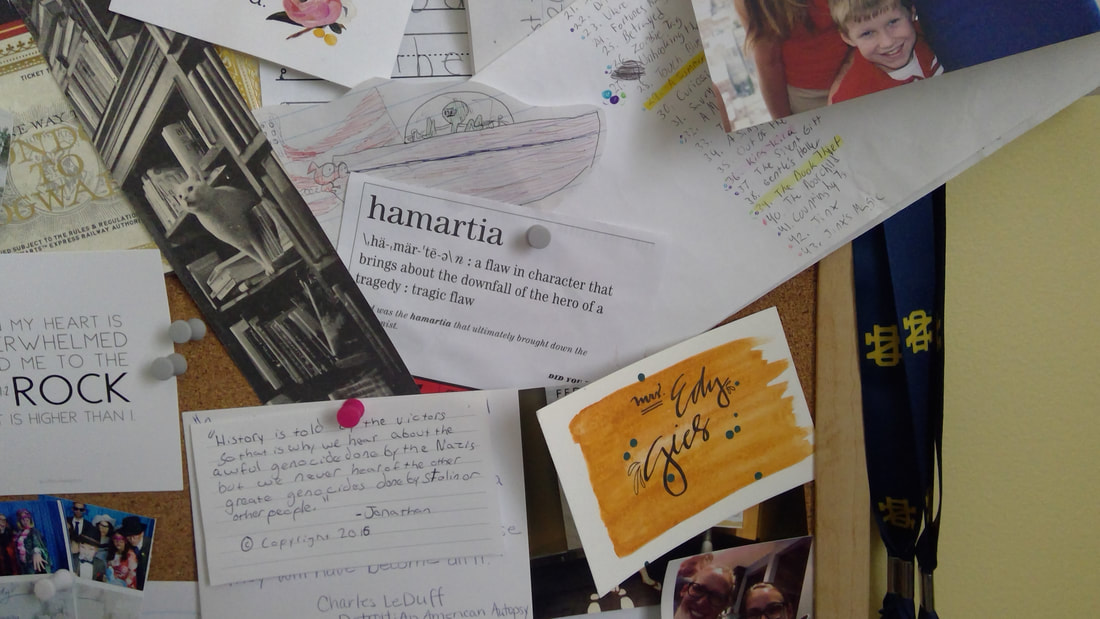 One of my favorite shows growing up was the A-Team. The falsely accused Green Berets hid out in the Los Angles underground helping underdogs that were being oppressed. Often they would be overtaken and locked up by the bad guys or trapped by some scheme. (Inexplicably, they were always trapped with lots of power tools and fixable equipment.) The leader, Hannibal Smith, would devise a plan and the team would execute it. After achieving victory, he would always say, "I love it when plan comes together." As a learner, I love it when my reading combines to form a concrete and deeply understood idea. As silly as it seems, I get that satisfied feeling of everything coming together as it was planned to be. Today's word is an example of this coming together of ideas. In my previous career as an English teacher, I was teaching Macbeth and discussing the concept of a tragic or fatal flaw. In Shakespeare's tragedies, the characters have a tragic flaw which is the ultimate cause of their destruction. In the plays we studied, the characters get what they want, but not in the way they saw it happening. Romeo and Juliet want to be together forever. They get that, but their togetherness is in death, not life. Macbeth is ambitious and wants to be above the rest as their leader. At the end of the play, he is raised up, but it is his head on a pike that is raised. As I was teaching this concept, a student said, "There's a word for that." Questioning her I said, "A word for what?" She said that there was a word for a tragic flaw, but she couldn't remember what it was. She had read it in The Fault in Our Stars by John Green. I had read the book myself and but had missed that part. Fortunately, she knew where it was mentioned in the story and I had a copy of the book on my Kindle. We looked it up and, sure enough, found it. The word was hamartia. Around the same time, I purchased the book The Ology: Ancient Truths Ever New by Marty Machowski. It was recommended to me by a friend. The book teaches systematic theology to young children by breaking down the concepts into very understandable ideas with many illustrations. They call things "The Ology of of God" or "The Ology of Christ" instead of Theology or Christology. This helps kids understand and grasp the understanding that "ology" simply means "the study of." One of the "ologys" mentioned is "The ology of sin". I was looking up the actual name of this ology and discovered that it is Hamartiology. At this point, it hit. Sin is our tragic flaw. When I looked up Hamartiology the sources said that in Hamartiology, hamartia is defined more as the missing of a mark, because sin keeps us from missing the mark of God's glory and perfection. (Romans 3:23) But I think that the tragic or fatal flaw definition also makes sense here. I brought this back to my class and we discussed the impact that sin has on us. Although mankind was created perfect in God's image, sin marred that perfection and became our tragic fatal flaw. Today's Word: Hamartia Four syllables. Pronounced [hah-mahr-tee-uh]. Noun. Defined on dictionary.com as a tragic flaw. Today, I challenge you to contemplate your own tragic flaw. The sin that you cannot conquer on your own that only Christ can clean up for you. It can get overwhelming, but praise God that he didn't leave us without hope and offers us salvation from our hamartia. I would also like to mention that this discovery was made possible by three things. (1.) The Holy Spirit guiding and directing in my life. (2.) Reading a wide variety of books on a wide variety of topics and reading what the students in my classroom were reading at the time. (3.) A classroom that allowed for expression and curiosity. I allowed the student to question me and my limited knowledge regarding the word for a tragic flaw. I indulged the curiosity of the moment by stopping the lesson and searching for an answer. I came back to them with updates as I learned from The Ology. This all took time away from my original plans, but the impact was much greater than had we just moved on. Shortly after this, a student brought in a page from his Word-a-Day calendar. I still keep it hung on my wall to remind me of the lessons we learned and the joy I felt in teaching those students.
0 Comments
Leave a Reply. |
"A jack of all trades is a master of none, but oftentimes better than a master of one." Archives
May 2020
Categories
All
|
AdventuresGet in Touch |

 RSS Feed
RSS Feed